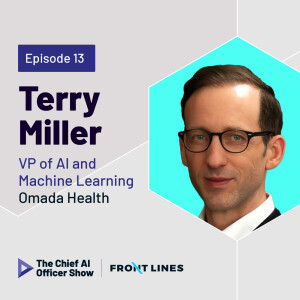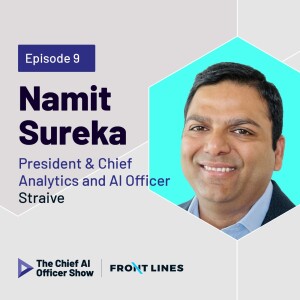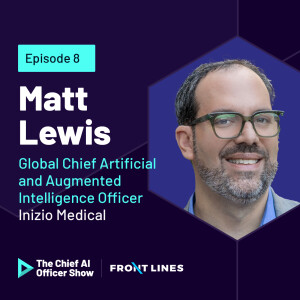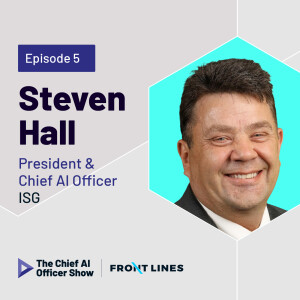The Chief AI Officer Show
The Chief AI Officer Show bridges the gap between enterprise buyers and AI innovators. Through candid conversations with leading Chief AI Officers and startup founders, we unpack the real stories behind AI deployment and sales. Get practical insights from those pioneering AI adoption and building tomorrow’s breakthrough solutions.
Episodes

Tuesday Dec 03, 2024
Tuesday Dec 03, 2024
Denise Xifara, Partner at Mercuri, shares her expertise on the evolving landscape of AI in the media industry. She discusses the transformative impact of generative AI on content creation and distribution, emphasizing the need for responsible product design and ethical considerations.
Denise also highlights the unexpected challenges faced by AI startups, particularly in fundraising and the importance of differentiation in a competitive market. With her insights into the future of AI and its implications for media, this episode is a must-listen for anyone interested in the intersection of technology and innovation.
Topics discussed:
The transformative impact of generative AI on content creation, enabling endless media generation and personalized experiences for users across various platforms.
The importance of responsible product design in AI, ensuring compliance with regulations while respecting privacy and civil liberties in technology development.
Unexpected challenges faced by AI startups, particularly in fundraising, which can be more daunting than securing capital for traditional companies.
The need for differentiation and defensibility in a crowded AI market, emphasizing the importance of unique value propositions for long-term success.
How AI is reshaping the media value chain, including content creation, distribution, consumption, and monetization strategies for startups.
The role of venture capital in supporting AI innovation, highlighting the importance of partnerships between investors and founders for sustainable growth.
Insights into the evolving regulatory landscape for AI, and how compliance can be integrated into business strategies without stifling innovation.
The significance of a solid data strategy for AI companies, ensuring that data collection and usage align with business goals and ethical standards.
The impact of AI on user expectations and experiences, reshaping how consumers interact with digital products and services in everyday life.
The future of AI in media, exploring potential advancements and the ongoing evolution of technology that could redefine industry standards and practices.
(Episode 14)

Wednesday Nov 13, 2024
Wednesday Nov 13, 2024
Terry Miller, VP of AI and Machine Learning at Omada Health shares his unique journey from the industrial sector to healthcare, highlighting the transformative potential of AI in improving health outcomes.
He emphasizes the importance of a human-centered approach in care, ensuring that AI serves as an augmentative tool rather than a replacement. Additionally, Terry discusses the challenges of navigating the evolving regulatory landscape in healthcare, focusing on privacy and compliance.
Topics discussed:
The transformative potential of AI in healthcare and its ability to enhance patient outcomes while streamlining administrative tasks within healthcare organizations.
The importance of maintaining a human-centered approach in care, ensuring that AI complements rather than replaces the essential role of healthcare professionals.
Navigating the evolving regulatory landscape in healthcare, including compliance with HIPAA and the implications of privacy concerns for AI deployment.
The role of generative AI in healthcare, including its applications for context summarization and how it can support health coaches in patient interactions.
Strategies for ensuring the veracity and provenance of AI-generated outputs, particularly in the context of healthcare applications and patient-facing information.
Building an effective AI team by compartmentalizing roles and responsibilities, focusing on distinct functions within ML Ops and LLM Ops for efficiency.
The significance of aligning AI initiatives with business goals, demonstrating measurable impact on revenue and operational efficiency to gain executive support.
The challenges and opportunities presented by AI startups focusing on diagnostics, and the need for human oversight in AI-driven decision-making processes.
The potential for real-time, dynamic care through the integration of diverse health data sources, including wearables and IoT devices, to optimize patient health.
The importance of sharing best practices and shaping policy through collaborations, such as the White House-supported healthcare AI commitments Coalition.
(Episode 13)

Tuesday Oct 29, 2024
Tuesday Oct 29, 2024
Nicolas Gaudemet, CAIO at onepoint, shares his insights on the evolving landscape of artificial intelligence and its implications for society. He discusses the significant impact of generative AI on democracies, particularly concerning misinformation and deepfakes.
Nicolas also emphasizes the importance of effective change management when implementing AI solutions within organizations, highlighting the need to address both technical and human aspects. Additionally, he explores the ethical considerations surrounding AI development and the necessity for critical thinking in evaluating AI outputs.
Topics discussed:
The transformative impact of generative AI on democracies, particularly regarding the spread of misinformation and the challenges posed by deepfakes in public discourse.
The importance of change management in successfully implementing AI solutions, focusing on both the technical and human dimensions within organizations.
Ethical considerations surrounding AI development, including the responsibility of companies to mitigate biases and ensure fairness in AI systems.
The role of recommendation systems in amplifying harmful content on social media, contributing to echo chambers and polarization in society.
Strategies for fostering collaboration between public laboratories and private companies to drive innovation and translate research into practical applications.
The significance of critical thinking when using AI tools, ensuring users remain vigilant about the accuracy and reliability of AI-generated outputs.
Insights into Nicolas's journey from engineering to policy-making, and how his experiences shaped his perspective on AI's societal implications.
The necessity for robust frameworks and regulations to address the risks associated with AI technologies and protect democratic values.
The potential for AI to enhance productivity across various sectors, while emphasizing the need for organizations to redesign processes to fully leverage these tools.
The future of AI in shaping organizational structures and management practices, as companies adapt to the evolving technological landscape.
(Episode 13)

Tuesday Oct 15, 2024
Tuesday Oct 15, 2024
Bob Friday, Group VP & CAIO at Juniper, shares his insights on the evolving role of AI in network automation and user experience. He discusses how large experience models are being utilized to predict user satisfaction and enhance the overall performance of enterprise networks.
Bob also emphasizes the importance of prioritizing user experience over traditional network maintenance and highlights the need for human validation in AI implementations to ensure effectiveness. He provides valuable perspectives on the future of AI in networking and its potential to transform how businesses operate and serve their customers.
Topics discussed:
How AI is revolutionizing network automation by streamlining processes and reducing the time required for data analysis and troubleshooting.
The shift in enterprise priorities towards enhancing user experience, making it a critical aspect of network management and operations.
How large experience models can predict user satisfaction, helping businesses better understand and respond to their network performance needs.
The importance of human validation in AI implementations is highlighted, ensuring that AI solutions are effective and continuously improved over time.
The challenges organizations face when integrating AI into their operations, including data privacy, security audits, and ethical considerations.
The emergence of conversational interfaces as the next generation of user interaction in networking, moving away from traditional command-line interfaces.
How Juniper conducts pilot tests for AI solutions, evaluating their impact and effectiveness before full-scale deployment.
The potential of generative AI to enhance supply chain activities, showcasing its versatility across various business functions.
Strategies for filtering and prioritizing network events, enabling IT teams to focus on actionable insights rather than being overwhelmed by data.
(Episode 11)

Tuesday Oct 01, 2024
Tuesday Oct 01, 2024
Stephen Drew, Chief AI Officer at Ruffalo Noel Levitz, explores the transformative role of AI in higher education. Stephen shares his journey into AI and discusses how conversational AI can enhance university services and improve student engagement, especially once models have improved even more.
He also highlights the importance of understanding and communicating the limitations of large language models to ensure responsible usage. Additionally, Stephen delves into leveraging data analytics to gain insights, enabling universities to make more informed decisions regarding enrollment and fundraising campaigns.
Topics discussed:
The role of conversational AI in improving university services and driving better student engagement and outcomes.
Importance of creating well-designed, efficient, and explainable machine learning models for educational applications.
Communicating the limitations of large language models to ensure responsible and ethical usage in educational settings.
Leveraging data analytics to gain deeper insights into CRM and SIS data for better decision-making in universities.
Developing targeted marketing and recruitment strategies to help universities meet their enrollment goals.
Building virtual advisors to assist students in making informed decisions about their career paths and course selections.
The necessity for universities to establish policies around the appropriate use of AI and data management.
The challenge of balancing personalization with the ethical implications of using AI in student advising.
The impact of AI on accelerating the admissions process and improving the overall efficiency of university operations.
(Episode 10)

Wednesday Sep 18, 2024
Wednesday Sep 18, 2024
Namit Sureka, President & Chief Analytics and AI Officer at Straive, explores the evolving landscape of enterprise AI. Namit shares his insights on managing client expectations by clearly communicating AI capabilities and limitations. He also discusses the importance of operationalizing AI to enhance business efficiency and decision-making.
Additionally, Namit emphasizes the need for continuous adaptation to rapid technological changes. His wisdom offers thought-provoking perspectives to anyone looking to navigate both the challenges and opportunities of AI.
Topics discussed:
The importance of clearly communicating AI capabilities and limitations to clients to manage their expectations effectively.
How operationalizing AI models can improve business efficiency and decision-making in large enterprises.
The necessity for continuous adaptation and updating skills in the fast-evolving AI landscape.
Strategies for balancing innovative AI experiments with maintaining traditional business processes.
The critical role of clear communication in articulating AI use cases and potential outcomes to both internal teams and clients.
Understanding the hype cycles in AI and their impact on client expectations and project deliverables.
The significance of high-quality data in driving successful AI projects and converting data to actionable insights.
Exploring how generative AI can be leveraged for summarization, interpretation, and enhancing decision-making processes.
Key challenges faced in operationalizing AI at the enterprise level, including integration and scalability issues.
Tactics for encouraging AI adoption within organizations by demonstrating the practical benefits and addressing skepticism.
(Episode 9)

Thursday Aug 08, 2024
Thursday Aug 08, 2024
Matt Lewis, Global Chief Artificial and Augmented Intelligence Officer at Inizio Medical, explores the transformative role of AI in the life sciences industry. Matt shares invaluable insights on the critical importance of harmonizing internal narratives to ensure consistent communication.
Matt gives his perspective on how generative AI can significantly enhance the capabilities of medical writers by providing comprehensive research and draft recommendations. He also discusses the importance of involving both champions and detractors early in the AI implementation process to ensure successful adoption.
Topics discussed:
The importance of maintaining consistent messaging across various platforms and audiences within life sciences organizations.
How AI can assist medical writers by providing comprehensive research, draft recommendations, and enhancing overall efficiency.
The value of involving both champions and detractors early in the AI implementation process to ensure successful adoption.
Utilizing AI to gain a deeper understanding of disease epidemiology, mechanisms of action, and clinical data.
Strategies for managing change and addressing biases when implementing AI solutions in organizations.
Ensuring that scientific data is communicated consistently through abstracts, posters, papers, and other means.
Addressing data privacy concerns and ensuring secure data handling in AI projects.
Identifying and overcoming challenges when bringing AI solutions to life across teams.
Developing achievable AI roadmaps for organizations to ensure successful long-term implementation and transformation.
(Episode 8)

Thursday Jul 25, 2024
Thursday Jul 25, 2024
Philipp Herzig, Chief AI Officer at SAP SE discusses the current state of enterprise AI, discussing its potential for transformative business outcomes and the challenges companies face in implementation.
Philipp shares his thoughts on responsible AI practices, emphasizing the importance of transparency, bias mitigation, and explainability in AI deployment. Additionally, he highlights the essential skills for AI leadership, including the need for strong soft skills, a comprehensive strategy, and a customer-centric approach.
Topics discussed:
How enterprises are experimenting with AI and identifying legitimate use cases that drive business value.
Common hurdles like security, data privacy, and accuracy when implementing AI solutions in large enterprises.
The impact of AI on predictive maintenance, particularly in optimizing shop floor operations and factory workflows.
Emphasis on transparency, bias detection, and explainability to ensure ethical and responsible AI deployment.
Challenges and advancements in zero-shot prompting techniques for complex use cases in AI applications.
AI in Finance: Specific examples of AI applications in finance, such as sales forecasting and financial data summarization.
The importance of focusing on customer needs and identifying high-value use cases in both back-office and front-office applications.
Essential skills for aspiring AI leaders, including soft skills, strategic thinking, and a well-rounded understanding of AI, finance, and legal aspects.
The process of integrating AI projects within existing products and overcoming challenges faced by both the company and its customers.
(Episode 7)

Thursday Jul 11, 2024
Thursday Jul 11, 2024
Peter Voss, Founder, CEO, & Chief Scientist of Aigo.ai, discusses the current state of AI and its practical applications in enterprises. Peter shares his insights on the limitations of large language models, highlighting issues such as hallucinations, the black-box nature of these systems, and the finite scalability of training data, all of which mean a human will still need to be in the loop if these LLMs are to be implemented as business tools.
He also delves into the future of cognitive AI, discussing how adopting a cognitive approach can lead to more reliable, human-like intelligence and real-time learning capabilities. Additionally, Peter talks about the importance of integrating AI with human oversight to ensure accuracy and efficiency in business tasks.
Topics discussed:
How AI technologies are being integrated into business operations to enhance efficiency and decision-making processes.
The challenges of LLMs, including hallucinations, their black-box nature, and the finite scalability of training data.
How a cognitive approach can lead to more reliable, human-like intelligence and real-time learning capabilities in AI systems.
The importance of integrating AI with human supervision to ensure accuracy, reliability, and ethical considerations in business applications.
The significance of these cognitive abilities in developing advanced AI systems that can adapt and learn over time.
How AI can revolutionize various industries by automating complex tasks and providing intelligent insights.
Strategies and challenges enterprises face when adopting AI technologies, including the need for a clear understanding of AI capabilities and limitations.
The concept of AGI and how achieving human-level intelligence in AI could transform future technologies.
The need for AI systems to learn interactively and adapt in real-time to new information and scenarios.
Addressing the ethical considerations and responsibilities that come with deploying AI in business and society at large.
(Episode 6)

Thursday Jun 20, 2024
Thursday Jun 20, 2024
Steven Hall, President and CAIO of ISG (Information Services Group) for the Europe, Middle East, and Africa region. Steven talks about the transformative impact of AI on businesses and dives into the "Cambrian Explosion of AI," explaining how rapid innovation and significant investments are reshaping the tech landscape.
He also discusses the role of generative AI in accelerating software development, enhancing features and improving efficiency. Steven emphasizes the importance of a robust data strategy to maximize AI’s value and drive business success.
Topics discussed:
How the rapid innovation and massive investments in AI are reshaping the tech landscape.
How generative AI can accelerate software development by enhancing features, functions, and coding efficiency.
The need for a strong data strategy to maximize AI's value and drive business success.
Insights into how large companies are prioritizing and integrating AI into their operations for better efficiency and innovation.
Exploration of how AI can revolutionize talent acquisition, making it more efficient and accurate.
How businesses are measuring the success of their AI integration efforts and early use cases.
Best practices for successful AI adoption, including remaining curious and engaged with the technology.
Predictions on how AI will evolve over the next few years and its potential impact on various job roles.
How AI can streamline the software testing process, reducing defects and improving product quality.
The challenges and opportunities of using AI to capture and utilize the vast amount of unstructured data within organizations.
(Episode 5)


